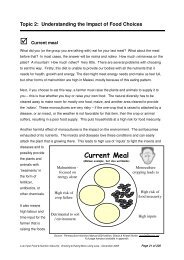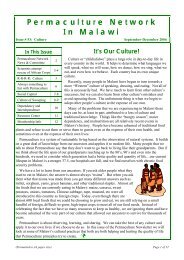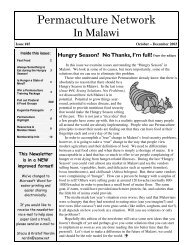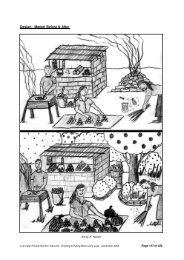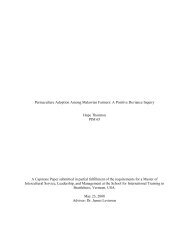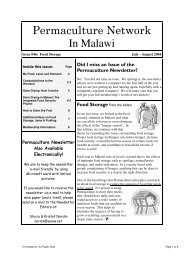Harmonisation of seed laws in Africa.indd - Never Ending Food
Harmonisation of seed laws in Africa.indd - Never Ending Food
Harmonisation of seed laws in Africa.indd - Never Ending Food
You also want an ePaper? Increase the reach of your titles
YUMPU automatically turns print PDFs into web optimized ePapers that Google loves.
GRICULTURE, ENERGY AND LIVELIHOOD SERIES<br />
and play such an active role <strong>in</strong> advocat<strong>in</strong>g for its adoption and implementation <strong>in</strong> <strong>Africa</strong>n<br />
governments is unforgivable. The FAO has organised and supported many regional workshops<br />
focused on the fast-track<strong>in</strong>g <strong>of</strong> <strong>seed</strong> policies, 80 and has funded Kenya’s revision <strong>of</strong> its PVP Act, which<br />
implements UPOV 1991.<br />
The FAO is also <strong>in</strong>volved <strong>in</strong> the World Seed Project, <strong>in</strong> respect <strong>of</strong> which Tanzania is one <strong>of</strong> the pilot<br />
countries. Very little <strong>in</strong>formation about this project is <strong>in</strong> the public doma<strong>in</strong>. The lack <strong>of</strong> transparency<br />
is an additional cause <strong>of</strong> major concern.<br />
The <strong>Food</strong> and Agricultural Organisation (FAO) pays lip-service to the importance <strong>of</strong> the <strong>in</strong>formal<br />
<strong>seed</strong> sector and the role <strong>of</strong> agricultural biodiversity. There is very little evidence that the FAO is<br />
advocat<strong>in</strong>g for the implementation <strong>of</strong> the Seed Treaty and its objectives, to nearly the same extent.<br />
Public sector agricultural research centres<br />
International and national agricultural research centres have also, one by one, caved <strong>in</strong> to fund<strong>in</strong>g<br />
and political pressures and developed their own IP policies and agreements protect<strong>in</strong>g plant breeder<br />
rights.<br />
These centres, such as the Consultative Group on International Agricultural Research (CGIAR),<br />
hold vast repositories <strong>of</strong> genetic resources. The CGIAR consists <strong>of</strong> 11 research centres, together<br />
ma<strong>in</strong>ta<strong>in</strong><strong>in</strong>g over 700 000 samples <strong>of</strong> crop, forage and agr<strong>of</strong>orestry genetic resources <strong>in</strong> the<br />
public doma<strong>in</strong>. Of these, 533 000 are designated as be<strong>in</strong>g ‘<strong>in</strong>-trust’ for the world community under<br />
agreements with the FAO. 81 But <strong>in</strong>stead <strong>of</strong> leverag<strong>in</strong>g this responsibility and tak<strong>in</strong>g a stand on IP,<br />
they are <strong>in</strong>creas<strong>in</strong>gly becom<strong>in</strong>g the silent partner <strong>in</strong> public-private partnerships with the <strong>seed</strong><br />
<strong>in</strong>dustry.<br />
USAID is, for example, fund<strong>in</strong>g ICRISAT, one <strong>of</strong> the CGIAR centres and Iowa Seed Science Center to<br />
implement a programme for the Susta<strong>in</strong>able Commercialisation <strong>of</strong> Seeds <strong>in</strong> <strong>Africa</strong> (SCOSA), which<br />
aims to br<strong>in</strong>g about coord<strong>in</strong>ation between the various regional harmonisation programmes.<br />
<strong>Africa</strong>n Research Institutions advocat<strong>in</strong>g for the<br />
Agrochemical Industries<br />
To create a more enabl<strong>in</strong>g environment for private sector participation <strong>in</strong> <strong>seed</strong> trade, many <strong>Africa</strong>n<br />
countries are <strong>in</strong>vest<strong>in</strong>g <strong>in</strong> the creation <strong>of</strong> an enabl<strong>in</strong>g policy environment to transform farm<strong>in</strong>g from<br />
the common quasi-subsistence nature to market oriented commercial entities. This is be<strong>in</strong>g done <strong>in</strong><br />
collaboration with development partners <strong>in</strong>clud<strong>in</strong>g the Common Market for Eastern and Southern<br />
<strong>Africa</strong> (COMESA), <strong>Africa</strong>n Union (AU), the East <strong>Africa</strong>n Community (EAC), Intergovernmental Authority<br />
on Development (IGAD) as well as donors. One <strong>of</strong> the avenues be<strong>in</strong>g pursued is the establishment <strong>of</strong><br />
common regulatory structures to reduce transactions costs and promote <strong>in</strong>creased trade and hence<br />
use <strong>of</strong> improved <strong>seed</strong>s. 82<br />
The above extract from a 2006 ASARECA report more or less sums up the work <strong>of</strong> this <strong>Africa</strong>nstaffed,<br />
but foreign funded research and policy <strong>in</strong>stitution. <strong>Africa</strong>’s dependency on donors, has<br />
directed its development and science and knowledge systems to serv<strong>in</strong>g its colonial masters. By<br />
<strong>in</strong>sist<strong>in</strong>g on privatis<strong>in</strong>g research and breed<strong>in</strong>g, <strong>Africa</strong>’s <strong>in</strong>ternational donors, have ensured that the<br />
<strong>Harmonisation</strong> <strong>of</strong> <strong>Africa</strong>’s <strong>seed</strong>s <strong>laws</strong>: a recipe for disaster 29



